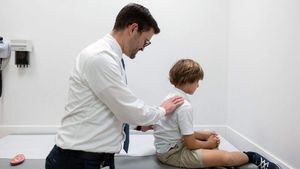September 17 2010 6:47 PM EST
Treatment GuideJust DiagnosedSex & DatingAfrican AmericanStigmaAsk the HIV DocPrEP En EspañolNewsVoicesPrint IssueVideoOut 100
CONTACTCAREER OPPORTUNITIESADVERTISE WITH USPRIVACY POLICYPRIVACY PREFERENCESTERMS OF USELEGAL NOTICE
© 2025 Pride Publishing Inc.
All Rights reserved
All Rights reserved
By continuing to use our site, you agree to our Privacy Policy and Terms of Use.
By Anthony S. Fauci, MD; Richard J. Hodes, MD; and Jack Whitescarver, Ph.D.
Older HIV-infected adults face unique health challenges stemming from age-related changes to the body accelerated by HIV infection, the side effects of long-term treatment for HIV, the infection itself and often, treatments for age-associated illnesses. September 18 marks the third annual National HIV/AIDS and Aging Awareness Day, an opportunity to highlight these challenges and the research under way to improve the health and quality of life of older people infected with HIV.
Many HIV-infected individuals are living into their 50s and well beyond as a result of the powerful combinations of antiretroviral drugs that suppress the replication of the virus. In 2006 an estimated 25% of people living with HIV in the United States were age 50 years and older. In those with long-term HIV infection, the persistent activation of immune cells by the virus likely increases the susceptibility of these individuals to inflammation-induced diseases and diminishes their capacity to fight certain diseases. Coupled with the aging process, the extended exposure of these adults to both HIV and antiretroviral drugs appears to increase their risk of illness and death from cardiovascular, bone, kidney, liver, and lung disease as well as many cancers not associated directly with HIV infection.
In addition, a growing number of adults in their 40s and 50s with long-term HIV infection are experiencing syndromes that resemble premature aging. For instance, these individuals have a greater risk of impaired kidney function and end-stage renal disease than their HIV-uninfected counterparts. They also are three to four times more likely to develop osteoporosis, increasing their risk for bone fractures. In addition, 55-year-old HIV-infected men are as likely to be in frail condition as are men ages 65 years or older who do not have HIV.
In 2008 an estimated 16% of all new HIV diagnoses occurred in people ages 50 years and older in the 37 states with confidential name-based reporting. HIV disease progresses more quickly in older compared with younger adults, and antiretroviral therapy restores immune system cells less effectively, placing this older group at greater risk for illness and death from HIV infection than younger people who are infected for comparable periods of time. Moreover, the higher rate of preexisting conditions in people of advanced age often complicates their treatment for HIV infection.
Older people and their health care providers may not consider individuals ages 50 years and over to be at risk for HIV infection, and consequently may not discuss or act on HIV prevention measures. To complicate matters, the signs and symptoms of AIDS in older adults can be mistaken for conditions associated with aging, delaying the diagnosis of HIV infection and the start of appropriate therapy. In the United States, nearly one fifth of the individuals ages 55 years and older who were living with HIV in 2006 did not know they were infected. As a consequence of both late HIV diagnosis and greater risk of progressing to AIDS, adults ages 50 years and older are more likely than any other age group to be diagnosed with AIDS within a year of their HIV diagnosis, according to data gathered between 1996 and 2005.
To counteract these trends, health care providers should routinely discuss risk factors for HIV infection with older patients, educate them about HIV prevention measures and offer HIV testing. Because early HIV diagnosis is key to optimal treatment, the Centers for Disease Control and Prevention recommends routine HIV testing for all adults up to age 64 years. The CDC also recommends HIV testing for adults ages 64 years and over who have risk factors for HIV infection, such as multiple sexual partners, unprotected sex or injection drug use. Medicare covers HIV screening once every 12 months for any Medicare participant who asks for the test.
The NIH is funding a variety of studies to address the challenges posed by HIV, including aging and the effects of long-term treatment with antiretroviral drugs. Study topics range from HIV-induced decline of immune system function to the increased risk of cardiovascular disease, from the effect of menopause-induced hormonal changes on HIV-infected women to the early detection of kidney disease, and from the decline of memory and cognition in long-term HIV infection to the greater risk of osteoporosis and bone fractures.
Some of these studies are being funded through an ongoing grant program called Medical Management of Older Patients With HIV/AIDS, established by the National Institute of Allergy and Infectious Diseases, the National Institute on Aging, the National Institute of Mental Health, and the National Institute of Nursing Research, all part of the NIH. This program continues to solicit research proposals to study a range of biomedical issues relevant to older adults with HIV infection.
HIV clearly poses a risk to individuals 50 years and older and presents complex treatment challenges. Therefore, older adults at risk need to get tested for the virus and take steps to protect themselves and their loved ones from becoming infected. In addition, NIH-funded research is under way to help health care providers tackle the often complicated treatment of HIV infection and related illnesses in older individuals, as well as the phenomenon of accelerated aging due to long-term HIV infection. While NIH continues to seek a cure for HIV infection and to develop more varied and powerful HIV prevention tools, we remain committed to helping HIV-infected adults live longer, healthier lives.
Fauci is director of the National Institute of Allergy and Infectious Diseases, Hodes is director of the National Institute on Aging, and Whitescarver is director of the Office of AIDS Research, all at the National Institutes of Health in Bethesda, Md.
Older HIV-infected adults face unique health challenges stemming from age-related changes to the body accelerated by HIV infection, the side effects of long-term treatment for HIV, the infection itself and often, treatments for age-associated illnesses. September 18 marks the third annual National HIV/AIDS and Aging Awareness Day, an opportunity to highlight these challenges and the research under way to improve the health and quality of life of older people infected with HIV.
Many HIV-infected individuals are living into their 50s and well beyond as a result of the powerful combinations of antiretroviral drugs that suppress the replication of the virus. In 2006 an estimated 25% of people living with HIV in the United States were age 50 years and older. In those with long-term HIV infection, the persistent activation of immune cells by the virus likely increases the susceptibility of these individuals to inflammation-induced diseases and diminishes their capacity to fight certain diseases. Coupled with the aging process, the extended exposure of these adults to both HIV and antiretroviral drugs appears to increase their risk of illness and death from cardiovascular, bone, kidney, liver, and lung disease as well as many cancers not associated directly with HIV infection.
In addition, a growing number of adults in their 40s and 50s with long-term HIV infection are experiencing syndromes that resemble premature aging. For instance, these individuals have a greater risk of impaired kidney function and end-stage renal disease than their HIV-uninfected counterparts. They also are three to four times more likely to develop osteoporosis, increasing their risk for bone fractures. In addition, 55-year-old HIV-infected men are as likely to be in frail condition as are men ages 65 years or older who do not have HIV.
In 2008 an estimated 16% of all new HIV diagnoses occurred in people ages 50 years and older in the 37 states with confidential name-based reporting. HIV disease progresses more quickly in older compared with younger adults, and antiretroviral therapy restores immune system cells less effectively, placing this older group at greater risk for illness and death from HIV infection than younger people who are infected for comparable periods of time. Moreover, the higher rate of preexisting conditions in people of advanced age often complicates their treatment for HIV infection.
Older people and their health care providers may not consider individuals ages 50 years and over to be at risk for HIV infection, and consequently may not discuss or act on HIV prevention measures. To complicate matters, the signs and symptoms of AIDS in older adults can be mistaken for conditions associated with aging, delaying the diagnosis of HIV infection and the start of appropriate therapy. In the United States, nearly one fifth of the individuals ages 55 years and older who were living with HIV in 2006 did not know they were infected. As a consequence of both late HIV diagnosis and greater risk of progressing to AIDS, adults ages 50 years and older are more likely than any other age group to be diagnosed with AIDS within a year of their HIV diagnosis, according to data gathered between 1996 and 2005.
To counteract these trends, health care providers should routinely discuss risk factors for HIV infection with older patients, educate them about HIV prevention measures and offer HIV testing. Because early HIV diagnosis is key to optimal treatment, the Centers for Disease Control and Prevention recommends routine HIV testing for all adults up to age 64 years. The CDC also recommends HIV testing for adults ages 64 years and over who have risk factors for HIV infection, such as multiple sexual partners, unprotected sex or injection drug use. Medicare covers HIV screening once every 12 months for any Medicare participant who asks for the test.
The NIH is funding a variety of studies to address the challenges posed by HIV, including aging and the effects of long-term treatment with antiretroviral drugs. Study topics range from HIV-induced decline of immune system function to the increased risk of cardiovascular disease, from the effect of menopause-induced hormonal changes on HIV-infected women to the early detection of kidney disease, and from the decline of memory and cognition in long-term HIV infection to the greater risk of osteoporosis and bone fractures.
Some of these studies are being funded through an ongoing grant program called Medical Management of Older Patients With HIV/AIDS, established by the National Institute of Allergy and Infectious Diseases, the National Institute on Aging, the National Institute of Mental Health, and the National Institute of Nursing Research, all part of the NIH. This program continues to solicit research proposals to study a range of biomedical issues relevant to older adults with HIV infection.
HIV clearly poses a risk to individuals 50 years and older and presents complex treatment challenges. Therefore, older adults at risk need to get tested for the virus and take steps to protect themselves and their loved ones from becoming infected. In addition, NIH-funded research is under way to help health care providers tackle the often complicated treatment of HIV infection and related illnesses in older individuals, as well as the phenomenon of accelerated aging due to long-term HIV infection. While NIH continues to seek a cure for HIV infection and to develop more varied and powerful HIV prevention tools, we remain committed to helping HIV-infected adults live longer, healthier lives.
Fauci is director of the National Institute of Allergy and Infectious Diseases, Hodes is director of the National Institute on Aging, and Whitescarver is director of the Office of AIDS Research, all at the National Institutes of Health in Bethesda, Md.
From our Sponsors
Most Popular
“So much life to live”: Eric Nieves on thriving with HIV
September 03 2025 11:37 AM
BREAKING: Supreme Court rules to save free access to preventive care, including PrEP
June 27 2025 10:32 AM
Thanks to U=U, HIV-positive people can live long, happy, healthy lives
July 25 2025 2:37 PM
The Talk: Beyond the exam room
August 13 2025 3:15 PM
Messenger RNA could be the key to an HIV vaccine — but government cuts pose a threat
August 20 2025 8:02 AM
“I felt like a butterfly”: Niko Flowers on reclaiming life with HIV
July 23 2025 12:22 PM
Dancer. Healer. Survivor. DéShaun Armbrister is all of the above
July 02 2025 8:23 PM
The Talk: Starting the conversation
July 25 2025 4:47 PM
Plus: Featured Video
Latest Stories
Amazing People of 2025: Javier Muñoz
October 17 2025 7:35 PM
It’s National PrEP Day! Learn the latest about HIV prevention
October 10 2025 9:00 AM
“I am the steward of my ship”: John Gibson rewrites his HIV narrative
September 16 2025 2:56 PM
The Talk: Owning your voice
August 25 2025 8:16 PM
The lab coat just got queer
August 21 2025 10:00 AM
The Talk: Navigating your treatment
August 01 2025 6:02 PM
How the Black AIDS Institute continues to fill in the gaps
July 25 2025 1:06 PM
1985: the year the AIDS crisis finally broke through the silence
June 26 2025 11:24 AM
VIDEO: A man living with HIV discusses his journey to fatherhood
June 10 2025 4:58 PM
Trump admin guts $258 million in funding for HIV vaccine research
June 03 2025 3:47 PM
Grindr is reminding us why jockstraps are so sexy and iconic
May 02 2025 5:36 PM
HRC holds 'die-in' to protest Trump health care cuts
April 28 2025 2:11 PM
Two right-wing Supreme Court justices signal they may uphold access to PrEP and more
April 21 2025 4:10 PM
500,000 Children at Risk: PEPFAR Funding Crisis
April 08 2025 3:51 PM
Broadway's best raise over $1 million for LGBTQ+ and HIV causes
April 03 2025 7:15 PM
The Talk Season 5 premieres this spring with HIV guidance for the newly diagnosed
March 26 2025 1:00 PM
Discover the power of Wellness in your life
March 26 2025 12:41 PM
Season 4 of The Switch on resilience & radical self-love returns this spring
March 26 2025 12:20 PM







































































